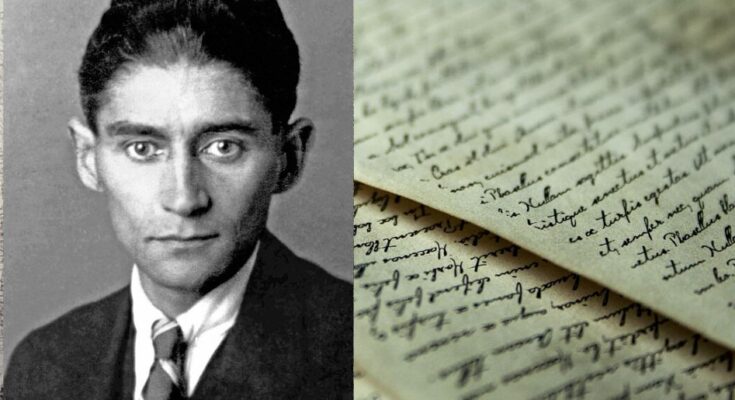There is nothing bad to fear; once you have crossed that threshold, all is well. Another world and you do not have to speak.
Franz Kafka’s 103-page letter to his father, known as “Brief an den Vater,” is a deeply personal and introspective work that offers a rare glimpse into the complex relationship between Kafka and his father, Hermann Kafka.
The letter, which was originally written in 1919, is a testament to Kafka’s tumultuous relationship with his father and the deep feelings of resentment, frustration, and love that he harbored towards him. In this blog post, we will delve into the philosophical, psychological, and literary aspects of Kafka’s letter, examining the themes of guilt and responsibility, the formation of the self, the pursuit of authenticity, and cognitive distortions among others.
The Psychological Analysis:―
1. Cognitive Distortions and Their Impact on Perceptions and Emotions
In “Letter to His Father,” Kafka’s portrayal of his father as a “tyrant” and use of absolutist language suggests that he may have been influenced by cognitive distortions, such as all-or-nothing thinking and overgeneralization.
These distortions involve an overly negative or biased view of a situation or person and can lead to distorted perceptions and negative emotions.
- All-or-Nothing-Thinking ― Kafka’s depiction of his father as an absolute authority figure, using words like “always” and “never,” suggests that he may have been influenced by all-or-nothing thinking, which involves viewing things in black-and-white terms and disregarding any nuance or complexity. This type of thinking can lead to distorted perceptions of reality and negative emotions, such as anger or despair.
- Overgeneralization ― Kafka’s portrayal of his father as a “tyrant” suggests that he may have been influenced by overgeneralization, which involves making broad, sweeping statements based on limited evidence. Overgeneralization can lead to distorted perceptions of people or situations and negative emotions, such as hopelessness or frustration.
2. Personal Responsibility and Accountability
In “Letter to His Father,” Kafka asks his father to recognize the harm he has caused and to seek redemption for his actions, implying that individuals have a moral obligation to take responsibility for their actions and make amends for any harm they have caused.
This theme highlights the importance of personal responsibility and accountability in relationships and in society at large.
3. Emotional Abuse and Its Impact on Cognition and Behavior
Kafka writes that he has always lived in fear of his father, suggesting that his father’s abusive behavior may have caused Kafka to develop maladaptive coping mechanisms, such as fear and avoidance, in order to protect himself from further harm.
This theme highlights the lasting impact of emotional abuse on an individual’s cognition and behavior, and the importance of addressing and healing from such trauma.
The Philosophical Analysis:―

1. The Formation of the Self
Kafka’s letter explores the impact of external expectations on the self and self-worth. In the letter, Kafka contemplates whether the self is shaped by external forces or if it exists within us independently.
2. The Influence of Guilt and Responsibility
The letter also touches on guilt and responsibility in relationships and how they affect us. Kafka writes about his feelings of guilt for not meeting his father’s expectations and the burden of trying to fulfill them.
This in fact raises questions about the nature of responsibility and how much we are responsible for others’ expectations and desires.
3. The Pursuit of Authenticity
In the letter, Kafka delves into the struggles of being a writer and the pursuit of authenticity in the face of external expectations. Through introspection and contemplation, Kafka grapples with the concept of authenticity and the extent to which we can remain true to ourselves amidst external pressures.
Also Read: 9 Valuable Lessons on Human Relationships from Tuesdays With Morrie
The Literary Analysis:―
- The Struggles of Being a Writer: Kafka writes candidly about the challenges he faced in finding his voice as an artist and the struggles he faced in his craft.
- Vivid and Evocative Language: Kafka uses vivid and evocative language to paint a vivid portrait of his tumultuous relationship with his father and his own inner turmoil. Kafka’s honest exploration of his emotions makes it a powerful and enduring work that continues to speak to readers to this day.
- Raw and Honest Emotions: Kafka’s exploration of his own emotions is raw and honest, making the letter a deeply moving and thought-provoking work.
Overall, “Letter to His Father” is a thought-provoking and emotionally charged work that invites readers to explore a multitude of philosophical, psychological, and literary themes.
The letter serves as a testament to Kafka’s complex relationship with his father and the intense emotions he experienced toward him.
The Best Books: Recommended Reading Lists
1. Best Books That Teach the Art of Living a HAPPIER LIFE
2. Best Books on STOCK MARKET & INVESTING
3. Best Books To Help You Find HOPE During Your Darkest of Times
4. Best Books on Learning & Mastering SONGWRITING
5. Must-Read Books on Punjab’s History and Culture
6. Best Books That Talk about SOLOGAMY
7. Books Chris McCandless Took On His Journey ― INTO THE WILD
8. From Ph.D. To Industry ― 4 Best Books To Aid Your Transition
That’s all we have for today. Thanks a lot for tuning in to HappinessDhaba. Do let us know your favorite Bukowski words in the comment section.
Signing off with my favorite words
Zindagi Zindabad!
Author Profile

Recent Posts
 The Punjabi LiteratureJuly 14, 2025Paash on the Death of Dreams ― Sab Ton Khatarnak
The Punjabi LiteratureJuly 14, 2025Paash on the Death of Dreams ― Sab Ton Khatarnak Blog PostsApril 6, 2025Rebuilding Identity After The Self Falls Apart | by Jasmeet
Blog PostsApril 6, 2025Rebuilding Identity After The Self Falls Apart | by Jasmeet Book Summaries & LessonsFebruary 6, 2025BURN IT ALL: Kafka’s Legacy and the Friendship That Saved It
Book Summaries & LessonsFebruary 6, 2025BURN IT ALL: Kafka’s Legacy and the Friendship That Saved It Life Through SongsJanuary 20, 20259 Best Punjabi Heer Ranjha Songs ― The Modern Playlist
Life Through SongsJanuary 20, 20259 Best Punjabi Heer Ranjha Songs ― The Modern Playlist











One Comment on “Kafka’s Letter to His Father ― An In-Depth Analysis”